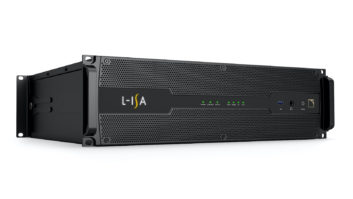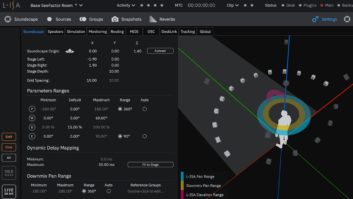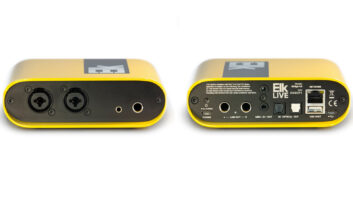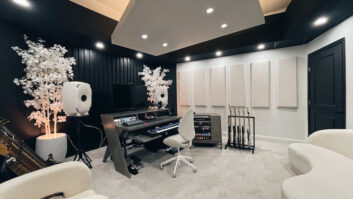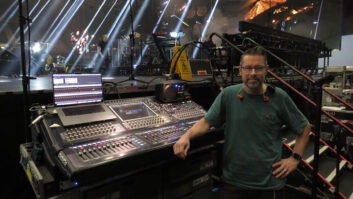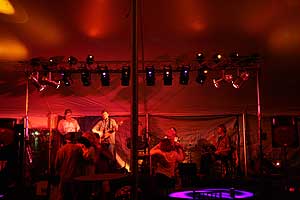
ADEK Recording Studios in Annapolis, Md., also offers live sound support to bands.
Editor’s Note: This is the third installment in our new online series written by and for mid-level studio owners. On a monthly basis, Studio Unknown owner Kevin Hill and creative director Lisa Horan will be calling around the country and bringing their own expertise to the issues that matter most to a successful studio life. Let’s face it, the middle has been hit hard in the economic downturn, but it’s also the middle that is most likely to come roaring back. This month, in keeping with the theme of our January live sound issue, Hill and Horan reveal how industry realities are sending owners out of the studio and into live venues.
The studio is booked 20 hours per day, seven days a week with billable hours. You’ve got staff a-plenty for round-the-clock coverage. Artist after artist and band after band are knocking on your door—anxious, willing and ready to pay your regular hourly rate to record and mix their tracks. Your feet are up. The phone is ringing. The dollars are flowing in.
The team at Skyline Audio Productions
Ahem. Sorry to disturb you, but it’s time to wake up, pal, because you’ve been dreaming. Don’t feel too badly, though. Just about every studio owner has the same dream. While it’s great to have big goals (and hey, we believe that anything is possible), let’s not get too carried away. The reality of today’s industry is pretty simple: Relying solely on session work for every penny of your income may no longer be the most practical option. At least, that’s what many studio owners believe, and as a result, they are supplementing their incomes by venturing outside of their four walls so they can put their AV backgrounds to use in live sound scenarios. We talked to three owners who are successfully doing just that.
Accepting the Business of Business
“From the day I got into the business, I realized that I could only make so much money selling time, especially considering that, in most cases, artists and bands tend not to have a whole lot of money to burn,” says Chanssez Wilkerson, owner of ADEK Recording Studios in Annapolis, Md. “If you are fortunate enough to run across one or two, that’s great. But the problem is that during the spring and summer months, they are typically out playing gigs, so one of the only times studio work really picks up is in the winter.” Keeping that in mind, when Wilkerson started his company in Los Angeles more than a decade ago, in addition to recording sessions, he also offered live sound support to bands. “Not only did this provide me with a way to get the name of my recording studio out there, but it was a great vehicle for making income.”
This was a concept that Aron Wilson figured out after a year into his studio business. Wilson’s Des Moines, Iowa–based Skyline Audio Productions, which he co-owns with brother Garrett and partner Josh Grant, started out as a project studio that Wilson ran from his basement. Early on, Wilson understood the process: In order to grow his business, he would have to be able to attract corporate clients. In order to attract corporate clients, he would have to operate his business from a professional space. In order to afford a professional space, he would have to diversify, and the most logical way to diversify was by going into live sound. “I knew we wouldn’t be able to rely strictly on the studio itself for all of our income, so we capitalized on my partner’s knowledge of live sound and installs, and both my and his knowledge and experience with P.A. systems,” explains Wilson. In addition to running sound at live shows and festivals, the two target touring bands that oftentimes come into to town and play at venues that don’t have suitable P.A. systems.
For Thaddeus Moore—owner and chief engineer of Sprout City Studios in Eugene, Ore.—the reality of the business came about after he ran himself ragged during the first five years of his studio’s existence. “It’s embarrassing to say, but from week to week, I didn’t know if I’d have enough money to pay my bills to keep my studio going,” he admits. “Something would come through and save me every time, but I finally realized that I would have to be forward-thinking and figure out what other hats I could wear to create a better situation.” Two events would prove pivotal. First, Moore enrolled in a class for small business, which helped him to think more like a business owner. Second, he began establishing relationships and introducing his services to his local community. In the process, the opportunity to get involved with live sound presented itself. “By going out there, I met a bunch of people who I never would have [met otherwise]. In addition to working on their albums and demos, I also did live sound for many of them and that opened up a whole new aspect of my business,” he says.
Thaddeus Moore—owner and chief engineer of Sprout City Studios
Managing the Details
But opening new facets of any business can also open up a can of worms if you aren’t careful. And getting a solid grip on day-to-day management is essential. Wilson and his partners recognized that each member of the team would have to be responsible for managing his share of the business. “My brother Garrett handles all of the bands, recordings, and studio session scheduling; I take care of the finances and live sound jobs; and Josh handles the third aspect of our business, our DJ services,” explains Wilson. This division of responsibilities not only enables each member of Wilson’s team to stay focused on his own area of expertise, but also helps the business stay organized.
Organizational skills were something that Moore knew he needed to develop. “I recognized that time management wasn’t my strong suit,” he admits. “Fortunately, the small-business class I took really helped me to create a strict time regimen for myself and keep track of my priorities.”
Beyond solid management practices, strong customer service is also critical, regardless of how many different “divisions” are within a company. “The philosophy I share with each of my employees is that their Number-One task should be treating people with respect,” Wilkerson says. “I’ve worked with sound guys who have toured with top bands, but if they have no idea how to treat clients and wind up ticking them off, they won’t work for me. It’s just that simple.” Wilkerson says that when it comes to management, live sound and studio sessions are no different: It’s all about keeping the client happy. “My job is to make everything as seamless as possible, and I go to great lengths to make that happen,” he adds. If that means going back and forth countless times between an act and a venue at a live event, Wilkerson does it because at the end of the day, both sides have to be happy in order for the show to be a success. “If the talent is stressed, so is the production, and then so is the audience. Unhappy audiences don’t buy drinks and don’t come back, just like unhappy listeners don’t want more from an artist, so it’s my job to keep everyone at their happiest.”
Seizing New Opportunities (Without Going Overboard)
Whether it’s keeping people happy or managing day-to-day duties, our business is all about balancing, and the more diversified a company is, the more necessary it becomes to be effective at balancing. Moore, Wilkerson and Wilson all know that first-hand. In addition to the studio and live sound divisions of their businesses, they each offer other services through their companies to generate supplemental income. ADEK provides multimedia production services, produces instructional and music videos, offers Website design and maintenance services, and provides live concert opportunities. Skyline features a DJ service and provides concert promotions for nationally touring acts. And Sprout City not only offers audio instruction classes and operates a rehearsal space, but company owner Moore also runs a lucrative vegan cupcake business with his wife.
However, one important caveat: Be careful not to take diversification too far. That’s a maxim Wilson now lives by as a result of an experience he and his team had while running sound for a live “School of Rock” type show. While the sound portion of the job went off without a hitch, the team didn’t bargain for having to take on lighting and special effects. “The guy who hired us didn’t have a huge budget, so he asked us to do the lighting and handle the fog machines,” Wilson recalls, saying the client wanted to create a super-dramatic effect by covering the entire area with fog. Unfortunately, as someone with no expertise in working with the machines, Wilson didn’t exactly create the look the client was hoping for. “I placed the fog machines strategically on the stage, but instead of this big billow of fog, what I got looked more like someone was smoking a cigarette on the stage,” Wilson says, laughing. “I made a promise to myself at that point not to go beyond what I know how to do well.”
At a time when diversification is becoming synonymous with survival, this may be the best lesson of them all.
Kevin Hill is the owner/engineer and Lisa Horan is the creative director of Studio Unknown, a full-service audio post-production facility and recording studio that specializes in helping clients discover creative sound for film, video, Web, gaming and artist projects.
